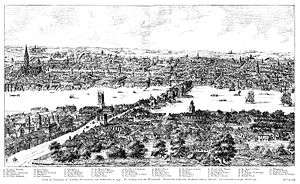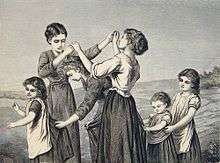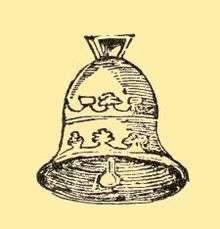Oranges and Lemons
"Oranges and Lemons" is a traditional English nursery rhyme, folksong, and singing game which refers to the bells of several churches, all within or close to the City of London. It is listed in the Roud Folk Song Index as No 13190.
| "Oranges and Lemons" | |
|---|---|
One of the 12 bells of St Leonard's, Shoreditch, removed for maintenance | |
| Nursery rhyme | |
| Published | c. 1744 |
Lyrics
Oranges and lemons,
Say the bells of St. Clement's.
You owe me three farthings,
Say the bells of St. Martin's.
When will you pay me?
Say the bells at Old Bailey.
When I grow rich,
Say the bells at Shoreditch.
When will that be?
Say the bells of Stepney.
I do not know,
Says the great bell at Bow.
Here comes a candle to light you to bed,
And here comes a chopper to chop off your head!
Chip chop chip chop the last man is dead[1]
Alternate version
Gay go up, and gay go down,
To ring the bells of London town.
Bull's eyes and targets,
Say the bells of St. Margret's.
Brickbats and tiles,
Say the bells of St. Giles'.
Halfpence and farthings,
Say the bells of St. Martin's.
Oranges and lemons,
Say the bells of St. Clement's.
Pancakes and fritters,
Say the bells of St. Peter's.
Two sticks and an apple,
Say the bells at Whitechapel.
Pokers and tongs,
Say the bells at St. John's.
Kettles and pans,
Say the bells at St. Ann's.
Old Father Baldpate,
Say the slow bells at Aldgate.
Maids in white Aprons
Say the bells of St Catherine's.
You owe me ten shillings,
Say the bells of St. Helen's.
When will you pay me?
Say the bells at Old Bailey.
When I grow rich,
Say the bells at Shoreditch.
Pray when will that be?
Say the bells of Stepney.
I'm sure I don't know,
Says the great bell at Bow.
Here comes a candle to light you to bed,
And here comes a chopper to chop off your head.[2]

As a game

The song is used in a children's singing game with the same name, in which the players file, in pairs, through an arch made by two of the players (made by having the players face each other, raise their arms over their head, and clasp their partners' hands). The challenge comes during the final lines:
- Here comes a candle to light you to bed.
- Here comes a chopper to chop off your head.
- (Chip chop, chip chop, the last man's dead.)
On the last word, the children forming the arch drop their arms to catch the pair of children currently passing through, who are then "out" and must form another arch next to the existing one. In this way, the series of arches becomes a steadily lengthening tunnel through which each set of two players has to run faster and faster to escape in time.[1]
Alternative versions of the game include: children caught "out" by the last rhyme may stand on a pressure plate behind one of the children forming the original arch, instead of forming additional arches; and children forming "arches" may bring their hands down for each word of the last line, while the children passing through the arches run as fast as they can to avoid being caught on the last word.[3] It was often the case, in Scottish playgrounds, that children would pair into boy and girl and the ones "caught" would have to kiss.
Origins and meaning

Various theories have been advanced to account for the rhyme, including: that it deals with child sacrifice; that it describes public executions; that it describes Henry VIII's marital difficulties.[1] Problematically for these theories the last two lines, with their different metre, do not appear in the earlier recorded versions of the rhyme, including the first printed in Tommy Thumb's Pretty Song Book (c. 1744), where the lyrics are:
Two Sticks and Apple,
Ring ye Bells at Whitechapple,
Old Father Bald Pate,
Ring ye Bells Aldgate,
Maids in White Aprons,
Ring ye Bells a St. Catherines,
Oranges and Lemons,
Ring ye bells at St. Clements,
When will you pay me,
Ring ye Bells at ye Old Bailey,
When I am Rich,
Ring ye Bells at Fleetditch,
When will that be,
Ring ye Bells at Stepney,
When I am Old,
Ring ye Bells at Pauls.[1]
There is considerable variation in the churches and lines attached to them in versions printed in the late eighteenth and early nineteenth centuries, which makes any overall meaning difficult to establish. The final two lines of the modern version were first collected by James Orchard Halliwell in the 1840s.[1]
Oranges and Lemons was the name of a square-four-eight-dance, published in Playford's, Dancing Master in 1665 (at a time when the plague was endemic and periodically erupted into massive epidemics, as in 1603, 1625, 1636 and the Great Plague of London in 1665-1666, when an estimated 100,000 people – almost a quarter of London's population – died within a period of 18 months), but it is not clear if this relates to this rhyme.[1] Similar rhymes naming churches and giving rhymes to their names can be found in other parts of England, including Shropshire and Derby, where they were sung on festival days, on which bells would also have been rung.[1]
The identity of the churches is not always clear, but the following have been suggested, along with some factors that may have influenced the accompanying statements:[1]
- St. Clement's may be St Clement Danes or St Clement Eastcheap both of which are near the wharves where merchantmen landed citrus fruits.
- St. Martin's may be St Martin Orgar in the City, or St. Martin-in-the-Fields near Trafalgar Square.
- St Sepulchre-without-Newgate (opposite the Old Bailey) is near the Fleet Prison where debtors were held.
- St Leonard's, Shoreditch is just outside the old City walls.
- St Dunstan's, Stepney is also outside the City walls
- Bow is St Mary-le-Bow in Cheapside.
- St. Helen's, in the longer version of the song, is St Helen's Bishopsgate, in the City.
Melody
The tune is reminiscent of change ringing, and the intonation of each line is said to correspond with the distinct sounds of each church's bells. Today, the bells of St. Clement Danes ring out the tune of the rhyme.[4]
Cultural references
The song is one of the nursery rhymes most commonly referred to in popular culture. These include George Orwell's Nineteen Eighty-Four (1949), where it is used as a snippet of nursery rhyme which embodies the forgotten past that protagonist Winston Smith yearns for. Various characters contribute snippets of the rhyme as the book goes on, and the last lines figure symbolically into the closing events of the second section.[5]
In 1951, the tune was used in the film, Scrooge, starring Alastair Sim. It can be heard around 50 minutes into the film at the introduction of The Ghost of Christmas Present. It is also sometimes sung in stage adaptations of A Christmas Carol.
American folksinger Pete Seeger recorded his "The Bells of Rhymney" version in 1958. The folk rock band The Byrds recorded their cover of his version in 1965, releasing it on their hit debut album Mr. Tambourine Man. Both Seeger and The Byrds used deeply resonant 12-string guitars in their arrangements.
In the 1963 horror-comedy The Old Dark House, part of the rhyme is heard on a tape recording played backwards while trying to discover the identity of the secret killer.
The rhyme is recited in a scene of the 1973 film The Wicker Man.[6]
The rhyme was also altered for the song "Clash City Rockers" (1978) by The Clash:
You owe me a move say the bells of St. Groove
Come on and show me say the bells of Old Bowie
When I am fitter say the bells of Gary Glitter
No one but you and I say the bells of Prince Far-I
A setting of the full Tommy Thumb's Pretty Song Book version for choir was written by Bob Chilcott. Entitled "London Bells", it is the third movement of "Songs and Cries of London Town" (2001).[7]
In the dystopian future of the video game Half-Life 2 (2004), oranges and lemons can be seen in graffiti on walls as symbols of the Resistance. This is a reference to the poem as it was used in Nineteen Eighty-Four.[8]
In Neil Gaiman's The Graveyard Book (2008), two lesser villains recite the rhyme to summon the man Jack.[9]
Benjamin Till composed music based upon the nursery rhyme which was performed in 2009 at St Mary Le Bow Church, London to honour 150 years of the great bell, Big Ben.[10]
In Doctor Who, revival series 6, episode 11 "The God Complex" (air date: September 17, 2011), the character called Joe "quotes the finale of old English nursery rhyme 'Oranges and Lemons', singing 'Here comes a candle to light you to bed, here comes a chopper to chop off your head!', which echoes a moment in George Orwell's Nineteen Eighty-Four, in which Winston Smith uses a snatch of the same rhyme to remind him of a forgotten and innocent past."[11]
In Ellen Raskin's 1975 book, The Tattooed Potato and Other Clues, the protagonist, Dickory Dock, has a pocket watch that plays this nursery rhyme, and the song forms a major part of the storyline.
Throughout the 2015 horror series The Frankenstein Chronicles, the rhyme recurs several times, as the central character (played by Sean Bean) suffers mercury-induced hallucinations relating to a missing girl.[12]
In the 2017 film It and its 2019 sequel It Chapter Two, both directed by Andy Muschietti, the song is recited by children while serving as a theme for the titular antagonist.[13]
In the NCIS season 8 episode, "Out of the Frying Pan" (2010), the medical examiner Dr. Mallard aka "Ducky" recites the final lines while cutting open a body for examination.
On the former BBC Light Programme it was used when the station started up in the morning at 9:00, 7:00, later 6:30, 5:30, and 6.55am (apart from Sundays at 8:00) and also to fill in local blank spots.
The final stanza appears as lyrics in Chumbawamba's limited-edition EP, In Memoriam: Margaret Thatcher on track six, "Waiting For Margaret To Go".[14]
See also
| Wikisource has original text related to this article: |
- Dong, Dong, Dongdaemun, Korean nursery rhyme for playing a similar game to Oranges and Lemons
- London Bridge Is Falling Down, another English nursery rhyme for playing a similar game to Oranges and Lemons
References
- I. Opie and P. Opie, The Oxford Dictionary of Nursery Rhymes (Oxford University Press, 1951, 2nd edn., 1997), pp. 337–8.
- "The Writer's Almanac with Garrison Keillor, June 29, 2011". Archived from the original on 2016-09-19.
- Oranges and Lemons (article in H2G2, an editable reference site hosted by bbc.co.uk).
- "St Clement Danes, The Strand London WC2 : tourist information from". TourUK. Archived from the original on 2012-02-22. Retrieved 2012-05-04.
- G. Orwell, 1984: a Novel (Signet Classic, 1990), pp. 178–9.
- "For its final cut, take one last dance around The Wicker Man". Retrieved 2019-03-24.
- "Chilcott: Songs and Cries of London Town – Oxford University Press". OUP. 2001-07-19. Retrieved 2012-05-04.
- "Graffiti". Combineoverwiki.net. Retrieved 2014-06-29.
- Gaiman, Neil, The Graveyard Book, New York City: Harper Collins, 2008.
- "BBC – Today – Ringing the dust off London's bells". BBC News. 2009-07-10. Retrieved 2012-05-04.
- "'Doctor Who': 10 Things You May Not Know About 'The God Complex' - BBC America".
- BBC First Australia (2016-02-03), Trailer - The Frankenstein Chronicles - BBC First, retrieved 2017-06-28
- Dry, Jude (September 13, 2017). "'It' Composer Benjamin Wallfisch on That Creepy Children's Song and How He Made Pennywise 'Omnipresent'". IndieWire. Retrieved June 21, 2018.
- "Chumbawamba--In Memoriam: Margaret Thatcher EP (complete)". YouTube. August 8, 2014. Retrieved August 6, 2020.
External links
- BBC School Radio online - Nursery Songs. "Oranges and Lemons" (with animation and lyrics)
- The British Library Sound and Moving Images Catalogue - List Recording 1CD0323981 on Audio CD : Oranges & lemons. Tunes from the collection 'The Dancing Master' (includes notes by Annegret Fischer, and song texts)
- Map of the likely church locations